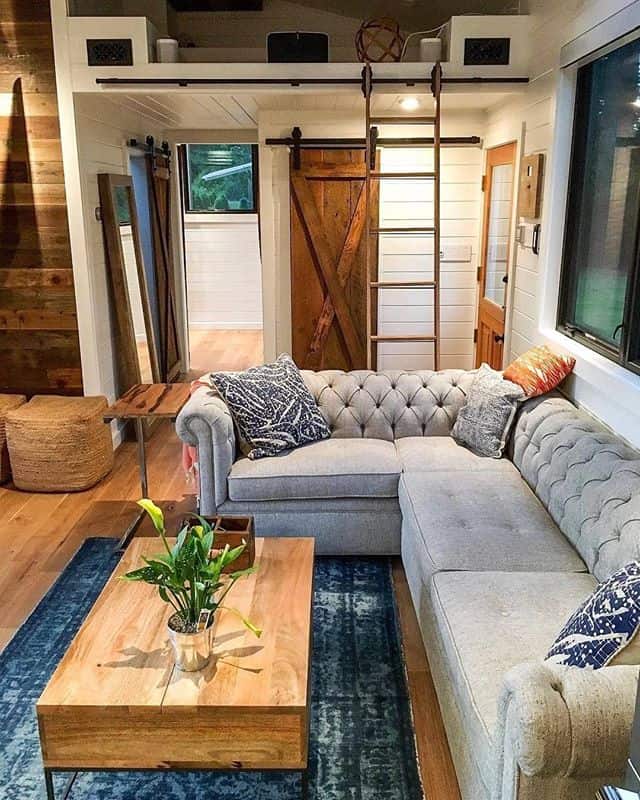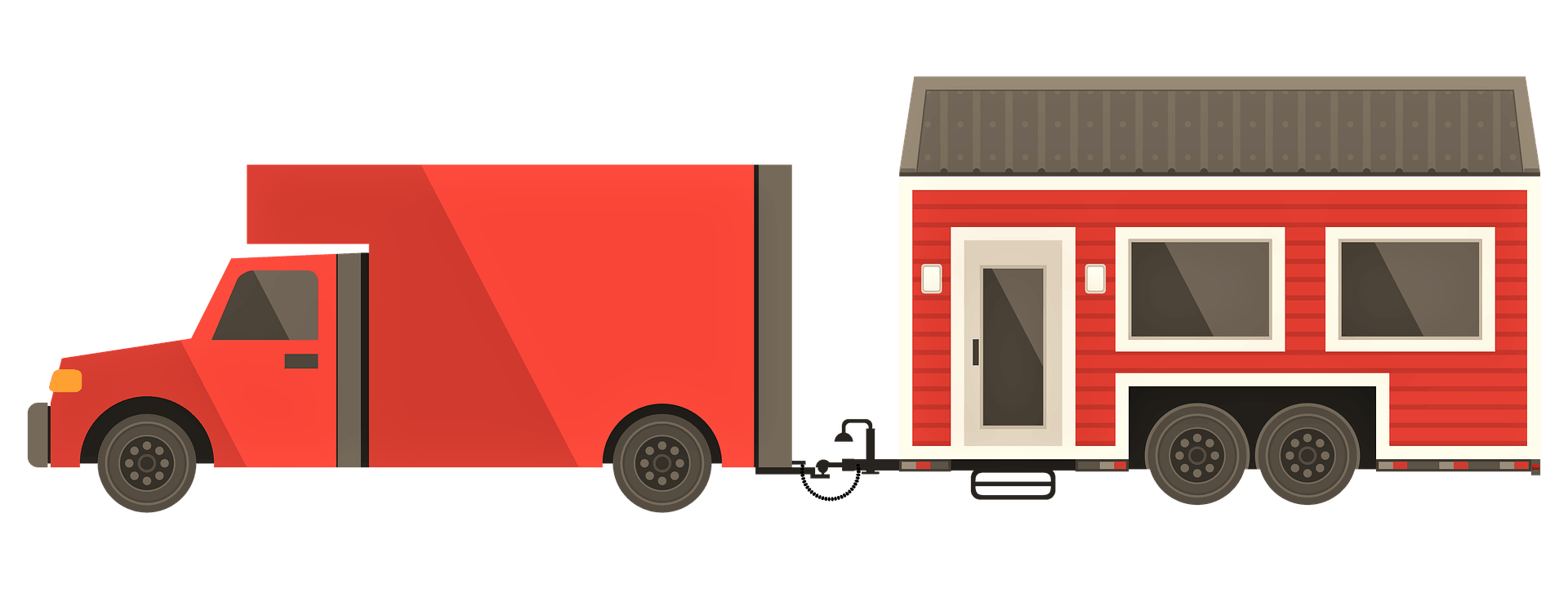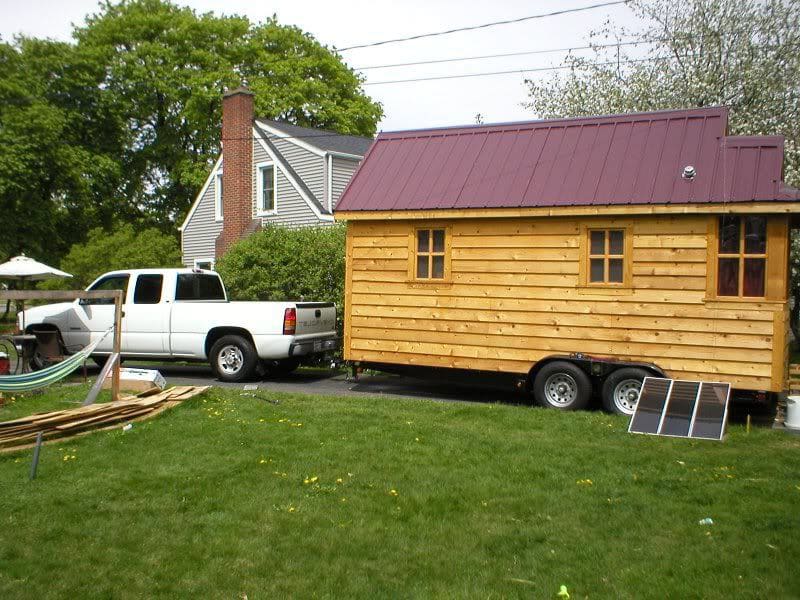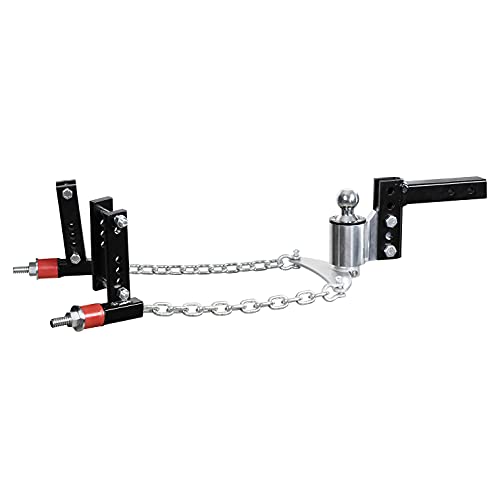You can expect an average tiny house weight to be between 2,500 to 8,500 pounds (1,134 to 3,856 kg). This would be for the weight of a small tiny house anywhere from 10 to 18 feet in length.
Tiny houses are built with similar materials to regular homes, which makes them significantly heavier than a traditional RV.
How much your tiny house weighs and whether or not you can tow it depends on which tiny house you decide to buy and what your vehicle's tow rating is. It's critical to stay within your limits to avoid any engine issues on your tow vehicle.
13 Example Tiny House Weights
The following chart features example tiny house weights of specific models ranging from the lightest to heaviest. Additional details can be found by asking the seller or manufacturing company. Here's the tiny house weight chart:
Tiny House Model | Length | Dry Weight |
|---|---|---|
Don Vardo | 10 feet (3 m) | 3,200 lbs (1,451 kg) |
Boulder | 16 feet (4.9 m) | 5,400 lbs (2,449 kg) |
Tumbleweed 18 | 18 feet (5.5 m) | 8,000 lbs (3,629 kg) |
Aspen | 20 feet (6.1 m) | 8,800 lbs (3,992 kg) |
Suryan | 20 feet (6.1 m) | 9,800 lbs (4,445 kg) |
Tumbleweed 24 | 24 feet (7.3 m) | 10,500 lbs (4,763 kg) |
Tumbleweed 26 | 26 feet (7.9 m) | 11,500 lbs (5,216 kg) |
Escape Trailer XL | 35 feet (10.7 m) | 13,000 lbs (5,897 kg) |
Red Mountain 34 | 34 feet (10.4 m) | 14,000 lbs (6,350 kg) |
Tiny House Weight Terms Explained
There are many various weights to consider when looking to buy and tow a tiny house. These consist of dry weight, gross vehicle weight rating, tongue weight, weight from furniture, and the tiny house itself of course.
Dry Weight
The dry weight of a tiny house is the total weight before you add water, personal belongings, furniture, and appliances. It's important to check the dry weight listed when buying a tiny house as some may or may not include certain factors.
Gross Vehicle Weight Rating (GVWR)
Make sure to check your vehicle's towing capacity. This can be found in your owner's manual or the manufacturer's website as your gross vehicle weight rating (GVWR).
Tongue Weight
Tongue weight refers to the downward force of the tongue of the trailer that applies to the hitch of the tow vehicle. Your tongue weight should be between 9% to 15% of the tiny house total weight (based on manufacturer). For example, if your tiny house weighs 10,000 lbs, then your tongue weight should be no more than 1,500 lbs.
Some standard trucks are not designed to carry much weight on their hitch. Many tiny house owners prefer a dually to provide more stability. If you plan on traveling hitched up often, it's best to use a weight distribution system:
Additional Weight From Furniture

When calculating your tiny house total weight, you'll also need to add the weight of furniture, appliances, decor, etc.
You can easily add about 500 pounds when you put in couches, beds, etc.
There are many great furniture options that fit in small spaces. Furniture is a crucial element to make your tiny home come together, while still keeping the weight in mind.
How To Tow A Tiny House
In order to tow your tiny house, you have a few different options:
- Buy a tow vehicle
- Rent a tow vehicle
- Hire a towing company
If you don't plan on moving often, your best bet is to hire a towing company. There's no point in worrying about towing your house if you only plan to move once a year.
For those moving every couple of months, you'll either want to rent or buy a vehicle. This of course depends on the logistics and pricing. For example, a couple could rent a tow vehicle and have one person tow while the other drives their personal vehicle.
If someone wanted to remain mobile at all times, such as moving every month or week, then they'll want to own their tow vehicle.
What Will My Tow Vehicle Need?

If you need to buy a tow vehicle, then you'll want to start by looking at tow ratings. You will need a tow vehicle that can handle the weight of your tiny house, plus your personal belongings in your tiny house and vehicle.
Once you've decided on your tow vehicle, you may need better brakes and a trailer brake controller (listed in next section). Your dealer should be able to help with what you'll need for towing with your specific vehicle.
In addition, side mirrors may need to upgraded in order to have adequate vision. Some tiny houses can be wide in which you'll need larger mirrors to see around it.
What Else To Get To Make Towing Easier?
Additional equipment can make towing your tiny house easier. The best items to get would include an RV GPS, backup camera, and trailer brake controller to make your drive much safer.
To Conclude
Tiny houses can vary quite a bit in both size and weight. Smaller homes tend to be lighter and more mobile. Larger homes provide more amenities, yet are much more difficult to move.
If you already own a vehicle fit to tow a tiny house, then you'll want to find a home that you can tow with what you already have. This way you can save money and drive with a vehicle you're already familiar with.
In addition, it's important to know the correct weight when looking to tow and transport your tiny house. If you're unsure and want specific weights, you can always go to a local cat scale to get a more accurate weight.





